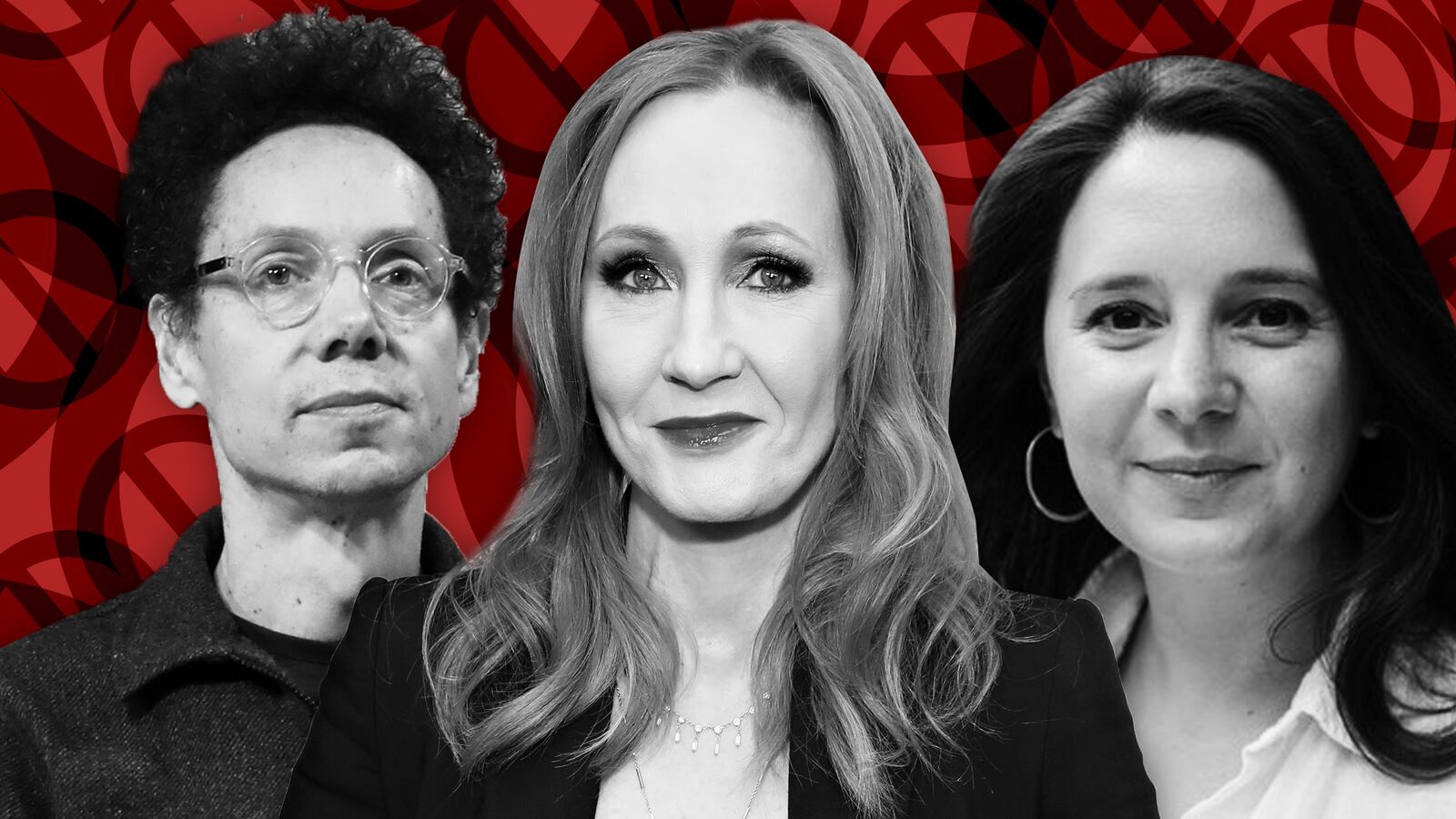It was the best of times, it was the worst of times, it was the age of wisdom, it was the age of...a bunch of wealthy blowhards deciding that now, of all times, is the appropriate moment to ask us all to stop being so mean to them on Twitter.
On Tuesday, Harper’s Magazine—the musty magazine of choice for musty magnates—published a ridiculous and delusional open letter signed by such luminaries as J.K. Rowling, Bari Weiss, David Brooks, Jesse Singal, and Malcolm Gladwell. The purpose of this screed? Ostensibly, to encourage “open debate.” But upon closer inspection, the upshot appears to be that writers and journalists should be able to advance whatever bullshit ideas they want without being held in any way accountable.
One might ask why anyone thought now, of all times, was the moment to do this. After all, we are in the middle of a pandemic. And an urgent movement for Black lives. Another recession is looming. So is an eviction crisis, and several more issues that feel more pressing than the right to spew transphobic garbage and sandwich-based class analysis without getting roasted on Twitter.
But of course, the letter purports to be about more than the mere specter of being laughed at online. It’s really, these writers want us to believe, about protecting free speech and stemming the tide of what this letter actually, sincerely calls a wave of “censoriousness” on the left. In other words, it’s about “cancel culture.” Sigh.
The letter begins by praising “protests for racial and social justice” that “are leading to overdue demands for police reform, along with wider calls for greater equality and inclusion across our society, not least in higher education, journalism, philanthropy, and the arts.”
But at the same time, it frets, “this needed reckoning has also intensified a new set of moral attitudes and political commitments that tend to weaken our norms of open debate and toleration of differences in favor of ideological conformity.”
The irony, of course, is that the ideological environment these writers are complaining about is more diverse and egalitarian than ever. Social media has opened the playing field when it comes to who can present and dispute ideas in a public forum. Our debates have, in reality, never been more “open” than they are right now. Back in the day to which these writers apparently wish to return, the only outlet for dissent was a letter to an editor—which might or might not be published or even read. Now, all critiques can reach a wide audience. Whether or not this is a pure good is a matter for separate discussion—but the idea that “open debate” has been stifled by this moment is hilariously out of touch.
As for the “toleration of differences” bit, it’s pretty rich to see those words next to signatories like Weiss, who went from, per The Intercept in 2018, essentially trying to “cancel” Arab Columbia professors who were critical of Israel, to whining about the so-called intolerant left in the New York Times opinion pages. Or Gladwell, who seemed unfazed when a publication that had pissed off too many of the wrong powerful people got sued into oblivion.
And then there are those who seem to be signing in the hopes of defending their right to characterize mistruths as simple “differences of opinion.” Rowling, for instance, has spent the last few weeks spouting misinformation in the hopes of labeling trans people a threat to women. Singal has spent years reporting junk science on trans people. Katie Herzog, who also signed the letter, became a household name after widespread backlash to an op-ed that did the same. (It’s worth noting that a lot of the people this letter accuses of bullying come from communities that already receive an outsize amount of online harassment—which can often grow worse after speaking out.)
The letter insists that the “free exchange of information and ideas, the lifeblood of a liberal society, is daily becoming more constricted.”
But what does this actually look like? The letter cites examples such as “a vogue for public shaming and ostracism” and “calls for swift and severe retribution in response to perceived transgressions of speech and thought.”
“More troubling still, institutional leaders, in a spirit of panicked damage control, are delivering hasty and disproportionate punishments instead of considered reforms,” the letter continues. “Editors are fired for running controversial pieces; books are withdrawn for alleged inauthenticity; journalists are barred from writing on certain topics; professors are investigated for quoting works of literature in class; a researcher is fired for circulating a peer-reviewed academic study; and the heads of organizations are ousted for what are sometimes just clumsy mistakes.”
There is no small irony in Harper’s publishing a letter bemoaning the firing of editors—considering that the magazine has ousted three editors in a row after disagreements with its publisher. Harper’s is also one of the remaining publications to bolster its workforce with unpaid internships—another practice that has traditionally guaranteed that media belongs only to those whose families are rich enough to float them for a few months or years. And regardless, each example is presented so vaguely that it is impossible to discuss or even consider them in any substantive way. What kind of investigation? What kinds of “clumsy mistakes?” Without details or context, these examples are meaningless.
It’s fitting that this letter would come out mere days after Donald Trump decried “cancel culture.” The parallels are actually kind of uncanny.
As Trump put it in his speech in front of Mount Rushmore: “Angry mobs are trying to tear down statues of our Founders, deface our most sacred memorials, and unleash a wave of violent crime in our cities... One of their political weapons is ‘Cancel Culture’—driving people from their jobs, shaming dissenters, and demanding total submission from anyone who disagrees. This is the very definition of totalitarianism, and it is completely alien to our culture and our values, and it has absolutely no place in the United States of America.”
“In our schools, our newsrooms, even our corporate boardrooms, there is a new far-left fascism that demands absolute allegiance,” Trump added. “If you do not speak its language, perform its rituals, recite its mantras, and follow its commandments, then you will be censored, banished, blacklisted, persecuted, and punished. It’s not going to happen to us.”
Trump was right about one thing: This kind of “blacklisting” and “persecution” likely isn’t going to happen to him or any of this list’s signatories. It hasn’t happened. Weiss is still a Times columnist. Singal still writes for New York magazine, as well as other publications. Gladwell still collects those sky-high speaker fees. Rowling’s literary agency refused to even affirm trans rights in the wake of her transphobic tweetstorm, so it was four trans writers who understandably left and now must find new representation.
None of this is new, of course. Conversations about “cancel culture” and how valid it actually is have become mind-numbingly common—so common, in fact, that it almost doesn’t feel worth discussing this pointless, vacuous letter. But as these writers have shown themselves to be just as intolerant of debate as they allege their dissenters have become, they have aligned themselves with Trump in their fear of democratized discourse—of a world in which, yes, bad ideas can lose you a job that is solely based on the quality of your ideas and your ability to express them.
The issue with “cancel culture,” as described by twerps on Reddit, these writers, and our dumb president, is that it does not exist. It connotes a concerted effort to take away people’s livelihoods when in reality, losing your platform simply means that a company has decided the value you produce is not equivalent to the liability you present. In other words: if you love the “marketplace of ideas” so much, you have to be prepared for the possibility that the market will decide your stale takes aren’t worth the price of day-old bread.
But the most hilarious part of The Letter is this sentence: “The restriction of debate, whether by a repressive government or an intolerant society, invariably hurts those who lack power and makes everyone less capable of democratic participation.”
“Those who lack power.” Who does that sentence claim to represent? “Those who lack power” are the ones producing the critiques and social media campaigns to which this letter objects. But surely this sentence can’t possibly be referring to the people who signed this list, right? You know, the authors and journalists and thinkers who apparently have enough resources and time to focus on their worst Twitter beefs while the rest of us are out protesting, sweating into our masks, and popping three melatonins a night just to get by? So what, on Earth, is this all really for?
The answer, of course, is obvious. It’s clear even simply from the letter’s lack of specific demands that this is just one big self-pity party at the worst possible time. If any member of this coven of fools has a concrete grievance and suggestion for restitution, let’s hear it. Until then, please just sit down and save it for your journal.
Update: Signatories Jennifer Finney Boylan and Kerri Greenidge both appear to have disavowed the letter. On Tuesday evening Greenidge tweeted, “I do not endorse this @Harpers letter. I am in contact with Harper's about a retraction.” Boylan, meanwhile wrote, “I did not know who else had signed that letter. I thought I was endorsing a well meaning, if vague, message against internet shaming. I did know Chomsky, Steinem, and Atwood were in, and I thought, good company. The consequences are mine to bear. I am so sorry.”



